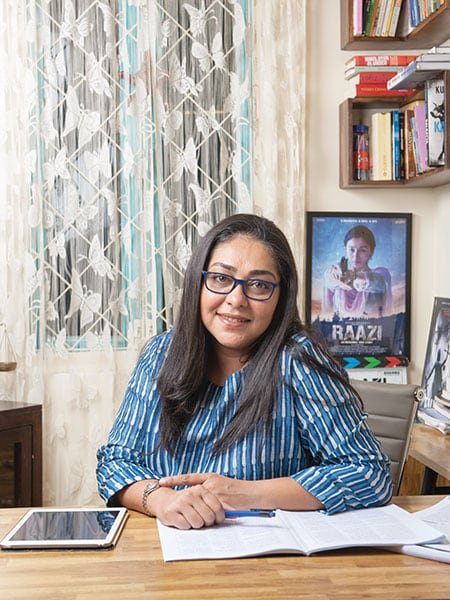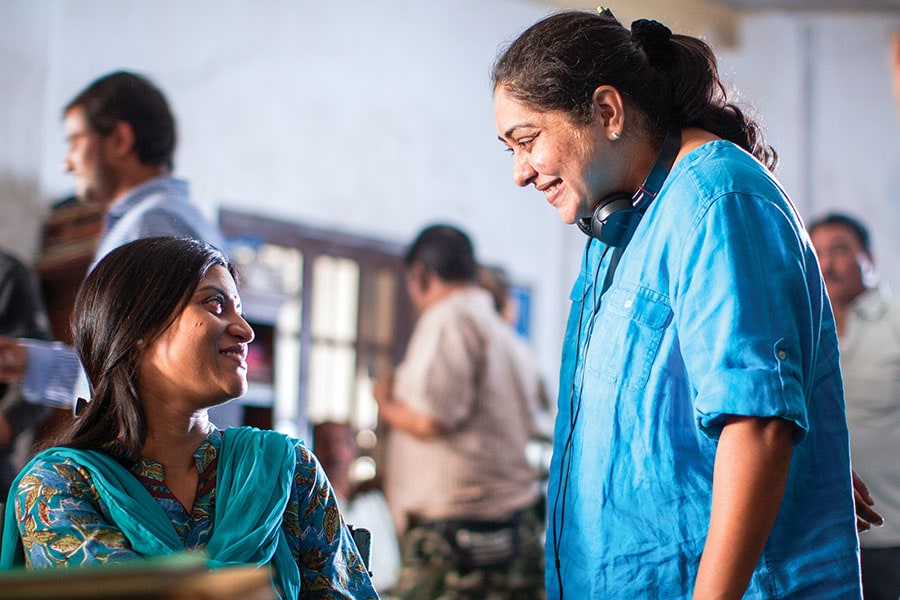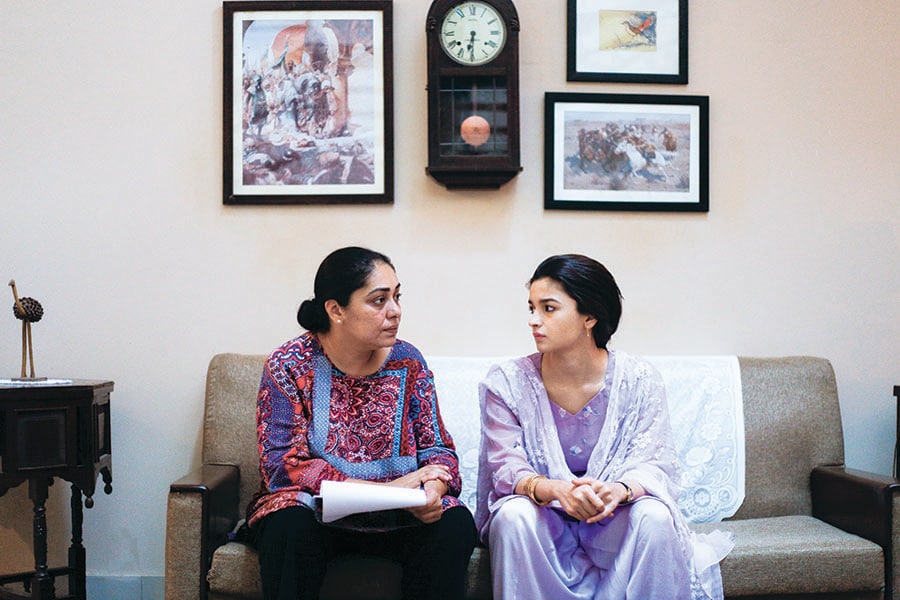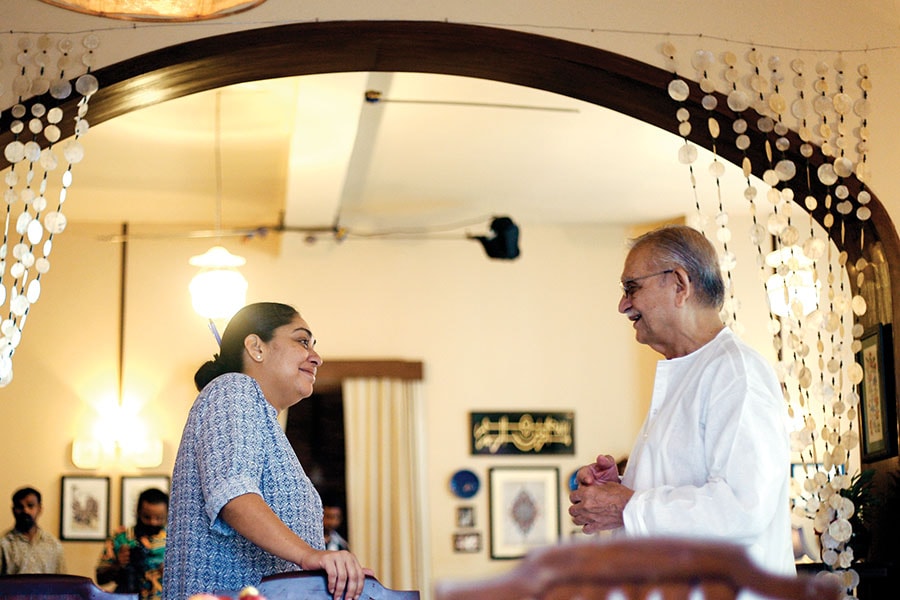Meghna Gulzar: Finding a new direction
The filmmaker battled self-doubt after the debacle of her first two films, but has found success, and comfort, in true life stories


 Image: Mexy Xavier
Image: Mexy Xavier
Meghna Gulzar does not put pen to paper unless she clearly visualises the idea in her head in the case of non-fiction, she goes by pure instinct
Meghna Gulzar broke down when the gathering at the success party of Raazi (2018) welcomed her with a thunderous applause. Among the elite of the entertainment world present at the event was her 83-year-old father—poet, lyricist and film director Sampooran Singh Kalra, better known as Gulzar. Elated at the acclaim that his filmmaker-daughter’s latest release had garnered, he gave her a warm hug. “It is such a relief for any parent when their child finally achieves, or is on the way to achieve, whatever she wants,” he tells Forbes India.
The octogenarian knows, more than anybody else, why this accomplishment matters to Meghna. He was, after all, witness to the agony and distress that his daughter experienced since debuting as a filmmaker with Filhaal in 2002.
The ₹120-crore performance of Raazi at the Indian box office and ₹200 crore-plus revenues worldwide give him solace. “It’s been a great struggle… and I admire it. At times, I wonder how she could have that kind of stamina and patience… and be so persistent,” he says of Meghna, 44, his only child.
****
A graduate in sociology from St Xavier’s College in Mumbai, Meghna was far removed from the world of films despite being the daughter of Gulzar and actor Rakhee. Acting offers continued to pour in while she was studying, but she was inclined towards other pursuits—in school, it was the piano and karate, while in college she freelanced for The Times Of India between 1989 and 1992. “My first assignment in the Sunday Times colour supplement was a piece on DJs, which included an interview with VJ Danny McGill. I was thrilled,” recalls Meghna, who also contributed regularly to Cinema In India, a publication of the National Film Development Corporation of India (NFDC).
The decision to become a filmmaker happened later, when she realised she did not want to study further. The easiest option was to assist her father, but she decided against it. “If the assistant is the director’s daughter, they will never be made to do things that they are supposed to do. The learning process would have been skewed. And I really wanted to learn,” explains Meghna.
Gulzar remembers how his “independent daughter” did not want her parents to recommend her to anyone. “At times, when she had to meet someone, she would have to wait for hours, without divulging who she was,” he recalls, adding that having famous personalities as parents brings with it its own pressure.
Meghna, instead, approached filmmaker Saeed Mirza, best known for Albert Pinto Ko Gussa Kyoon Aata Hai (1980) and the TV series Nukkad (1986), through his son Zahir, who was her college friend. She assisted Mirza in Naseem (1995), a 90-minute film about the days preceding the Babri Masjid demolition in 1992. In her early 20s then, Meghna left an indelible impression on Mirza with her work ethic. “She was acutely aware of the world we lived in it was not just films. And her understanding of stories was wonderful,” he reminisces. “Her infectious enthusiasm stood out, and she made a worthwhile contribution, whether it was at the ideation stage, script level, editing table or dubbing.”
What followed was a six-week filmmaking course at the New York Tisch School of the Arts. However, having already assisted on a film, she found the syllabus “too basic” for her liking. “My boyfriend at the time, now my husband [Govind Sandhu], who was also studying there, was a bigger motivation than going to film school,” Meghna admits. She stayed on in New York for nine months doing odd jobs, like working as a sales girl in an accessories store and hosting a show on a local Indian channel. The time she spent there “finding herself” taught her a lot. “I recall those days fondly. I learnt about the resilience that you have in you that you don’t know about till you tap into it.”
Upon her return to India, she anchored the Amul India Show in Hindi, in 1999-2000, to address her discomfort of facing the camera. But she figured out she would rather be behind it. Meghna even directed two 30-minute documentaries for Doordarshan: Insecurity (1998), on the security agencies in Mumbai, and Bai (1998), which showed how the area where female domestic help work in Mumbai had a correlation with their strata of life. She simultaneously began writing a black humour story, but “got bored by the end of it”. And then she wrote another which went on to become her first film.
 Image: Shaheen Muhammed
Image: Shaheen Muhammed
Meghna Gulzar with Konkona Sen Sharma on the sets of Talvar
Filhaal dealt with the issue of surrogacy, but failed to strike a chord with the audience. Actor Sanjay Suri, who played one of the leads in the film, says, “The film was ahead of its time… it was a mature subject, something that she was passionate about. And Meghna did not come across as a rookie director, although it was her first film. She was in complete control.”
The debacle, though, hurt Meghna so much that she began doubting her capability as a filmmaker. “It [the failure] discouraged me. Some of the reviews got a bit personal and vicious. To deal with that was not pleasant,” she admits. The damage was severe the mind began playing its games. Meghna went into a shell, staying within the confines of her Bandra apartment, and cutting off contact with the outside world.
“I did not do anything… I was only watching TV, movies, and reading. I had an anti-social phase I did not step out of the house… I wouldn’t go to meet my husband’s or my own friends and skipped birthday parties and get-togethers,” says Meghna. “Because I did not want to answer the question, ‘What are you doing next?’ I did not have an answer, and that’s the only question I would be asked.”
After a while, she did not want to have a conversation with her family either. They would ask what was she doing, and she could only mutter, “I am trying.” In that phase of self-assessment, she even wondered if she should go against her sensibility as a filmmaker and try something radically different. Amid all this, she wrote a book on her father, Because He Is in 2003 it was published in 2004.
Suri says Meghna is a warm and sensitive person, and she took the criticism personally. It took her five years to make her next film, Just Married (2007) in the same year, she also directed Puranmaashi in Dus Kahaniyaan, an anthology of 10 short films. Success eluded her again, and after the tepid response to Just Married, Meghna decided to shut shop. “I told myself I am not going through this again. It’s over,” she says. The question of changing her sensibility was also over. She was fighting a lonely battle. “Time moved slowly… My husband was working and weekends would come after a long time. I would be all alone before my son was born,” she recalls. The creative process, however, did not leave her. It would manifest itself in different forms: Gardening, renovating her father’s house, interior decoration, painting, drawing on the computer.
Meghna convinced herself that films didn’t define her completely and that she should now have a child. “We need to turn inwards and look at life beyond making films,” she told herself. After her son Samay was born in 2010, she was clear that she would spend the next couple of years looking after him.
As he grew older, she was confronted with the question that had tormented her in the past: “What next?” It took the stern words of producer-director Vishal Bhardwaj for Meghna to come out of her hibernation. “You can’t use your son as an excuse,” he told her bluntly. And thus she returned after an eight-year hiatus with Talvar (2015), which was written and co-produced by Bhardwaj.
 Image: Hitesh Mulani
Image: Hitesh Mulani
Alia Bhatt says the director is all about depth and emotions
"I look at Talvar as my rebirth as a filmmaker, because as a director I got to understand what I am good at: True life. It engaged me in a way that fiction didn’t,” says Meghna of the film, based on the 2008 double murder of 13-year-old Aarushi Talwar and her family’s domestic help Hemraj Banjade. The film was made on a budget of ₹9 crore and earned ₹38 crore, giving Meghna her first hit. But it was not enough for her to heave a sigh of relief. “I couldn’t. I had seen the 15 years before that… But I could see the happiness in my family. That was my yardstick. My family always told me I am happiest when I am working. A big part of my personality murjhaoed [shrivelled] when I didn’t work for 15 years.”
With Raazi, based on the book Calling Sehmat by Harinder S Sikka, a fictionalised account of a true story, Meghna blossomed as a filmmaker and further established her credentials. However, despite its success, she refuses to associate the word ‘confident’ with herself. “I’d say ‘comfortable’. I am now comfortable with my instinct,” she says.
The film’s protagonist Alia Bhatt says, to Meghna success does not mean ₹100 crore at the box office: “She is overtly modest about herself. Success to her is the love and involvement that she gets from people. She is not a materialistic person. She is all about depth and emotions.”
Meghna attributes the film’s performance to her diligent team. “The integrity of each person involved was so pure, and the dedication so complete… that’s what shows,” she says. Those who have worked with her assert that she led from the front. Says Bhatt: “She is a focussed director, who is sure of what she wants. She sees her world clearly and the attention to detail in everything that she does is immaculate. Meghna is not a taskmaster, but she is the boss you cannot take her for granted.”
Bhavani Iyer, who co-wrote Raazi with Meghna, agrees. “She is a meticulous person, and an academician at heart. There is no ‘chalta hai’ with her… there is no liberty that you can take,” says Iyer, who is also working on the filmmaker’s next, a movie on Field Marshal Sam Manekshaw. “She is a passionate and driven person, but not ambitious. It’s a strange dichotomy. She is such a purist I cannot believe somebody can be like this and be a director.”
 Image: Hitesh Mulani
Image: Hitesh Mulani
Gulzar admires the resilience shown by his daughter during her tough times
Books—from ones on the Indian Army to those by Saadat Hasan Manto—populate the shelves of Meghna’s cosy workspace in Bandra. A greeting card from her son is pinned on a soft board, while a writing board has options of possible opening shots along with pending research on incidents related to her next project. The filmmaker says she does not put pen to paper unless she clearly visualises the idea, with a beginning, middle and end. In the case of non-fiction, she goes by instinct.
Her affinity towards real-life stories is obvious. True life, she says, is an endless source of fabulous stories and inherently stronger than fiction. One such tale that has touched her heart is that of acid attack survivor Laxmi Agarwal. “It is traumatic as well as inspiring. It is something I definitely I want to tell,” she says. As Iyer puts it, “Meghna has a strong literary personality hiding within her, and that helps her get stories beautifully. She has seen a slightly steeper curve towards success, and therefore has a keen understanding of people.”
Her father also approves of her choices. “She is in step with futuristic cinema,” says Gulzar.
Filmmaking is a laborious process and one can cave in during arduous schedules. Meghna is not known to be one of them. She has calmed down over the years and says that if she feels the need to vent, she’ll cry. “It’s a catharsis in its own way,” she says. Bhatt says her endearing moments with Meghna during Raazi were the times when things did not go well: “She would never express herself, but hold her tears, go to a corner, let her emotions out, and come back and start directing.”
Like she did, at the Raazi success bash.
First Published: Jul 07, 2018, 08:00
Subscribe Now